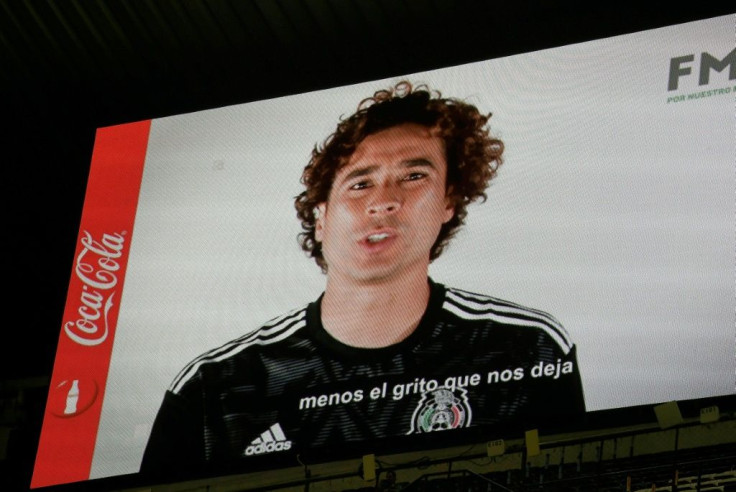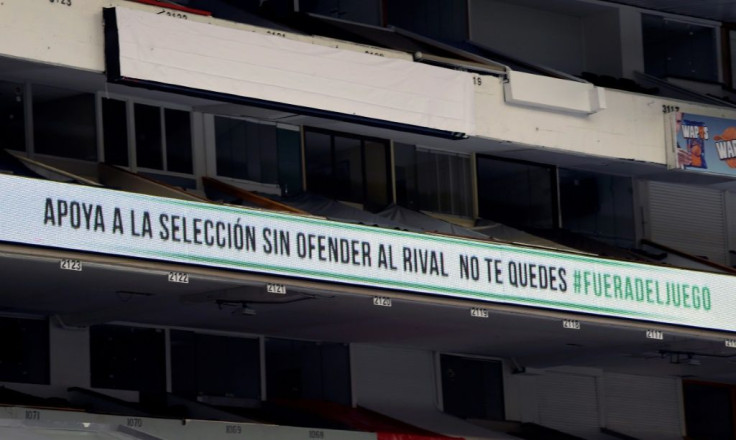Mexico Tries To Kick Homophobic Chant Out Of Football

The tension was palpable in the stadium every time the Panamanian keeper took a goal kick, as if everyone could hear the prayers of the Mexican Football Federation's bosses: "Fans, please don't say it."
"It" is "puto," a homophobic slur that Mexican fans often chant at the opposing team's keeper when he takes a goal kick.
The practice has landed the football-loving nation in hot water with FIFA, which has fined the Mexican federation, the FMF, 14 times over the chant since 2015, for a total of $190,000.
Mexico is far from alone in struggling to deal with racist or homophobic insults shouted from the stands.
But now, as a repeat offender, the country risks being banned from the 2022 World Cup in Qatar, FMF bosses warn.
Together with the Mexican first division, Liga MX, the federation has launched a campaign to achieve the seemingly impossible: kick the chant "Eeeeeh, puto!" out of Mexican football.
It will not be easy, as fans proved during Mexico's 3-1 win over Panama last week in Mexico City.
"It's not right to forbid us from chanting it. It's part of our culture. It's not hurting anyone," said Eusebio Valdez, a 52-year-old fan cheering on "El Tri" at Mexico's largest stadium, the Estadio Azteca.
'War cries'
"Every country has its own instantly recognizable chant. They're called war cries," Valdez told AFP.
FIFA, the FMF and the Mexican government disagree.

"Football has a giant megaphone. It has enormous public visibility. If we allow discrimination in football, we're condoning it in other areas, too," said Alexandra Haas, head of the National Council to Prevent Discrimination (CONAPRED), a government body that is working with the FMF on its campaign.
"Puto" literally means a male prostitute. But in Mexican Spanish it roughly translates as "faggot," and is widely used to insult someone's masculinity.
According to the local sports press, Mexican fans first began shouting it at matches in 2003, at a derby between Atlas and Chivas, the two top teams in Mexico's second city, Guadalajara.
The chant spread quickly, soon arriving at Mexican national team matches.
The president of the FMF, Yon de Luisa, warned last month that Mexico was facing dire consequences if fans did not stop.

"If we don't solve this problem before qualifiers start for the 2022 World Cup, it will endanger our chance to participate," he said.
"We are repeat offenders. Now we are facing more severe penalties, bigger fines, loss of points... even a ban."
It is a worldwide problem.
In Europe, a UEFA disciplinary commission is set to hear a case next week on Bulgarian fans who made racist monkey chants and Nazi salutes during a match against England.
Last month, UEFA ordered Romania, Hungary and Slovakia to play upcoming home matches behind closed doors over racist behavior by supporters.
FIFA president Gianni Infantino said last week that racist fans should be kicked out of stadiums worldwide.
Carrot and stick
Seeking to avoid a worst-case-scenario, the FMF and Liga MX have embarked on a major public relations drive that is part carrot and part stick.
They used both during the Mexico-Panama match for the CONCACAF Nations League.
"Shout anything you want, just don't shout the thing that will get us a red card," said a video played on the stadium's giant screens, featuring Mexican football stars including international keeper Guillermo Ochoa, a national icon.
When some fans shouted "puto" anyway, stewards escorted them from the stands. Media reports said 30 were expelled.
The federation says it will suspend matches if the problem continues, then play them in empty stadiums if that does not work.
Liga MX has also announced harsh measures for first-division matches.
Officials have the authority to stop matches, order the teams back to their changing rooms and penalize the local club.
"It's going to be good for football. We shouldn't all have to pay for the actions of a few people," said Erick Ramirez, an 18-year-old fan at the Mexico-Panama match.
"Now is the time to do it, because the World Cup is coming up."
© Copyright AFP 2024. All rights reserved.




















